情态动词归纳表格
情态动词表格
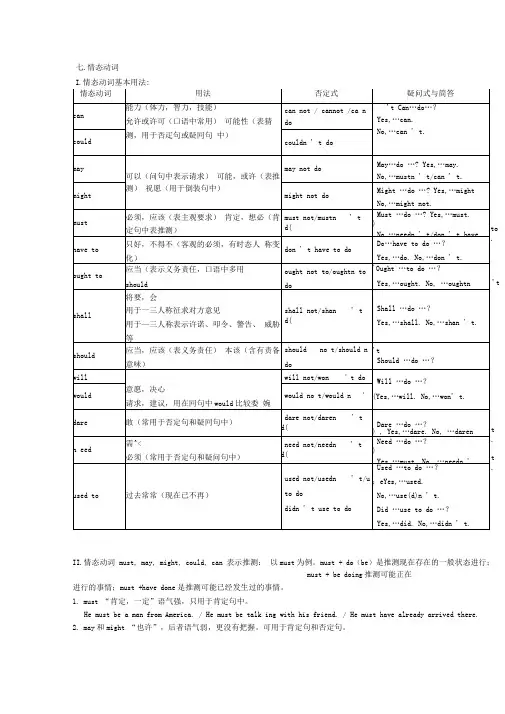
II.情态动词 must, may, might, could, can 表示推测: 以must 为例。
must + do (be )是推测现在存在的一般状态进行;must + be doing 推测可能正在进行的事情;must +have done 是推测可能已经发生过的事情。
1. must “肯定,一定”语气强,只用于肯定句中。
He must be a man from America. / He must be talk ing with his friend. / He must have already arrived there. 2. may 和might “也许”,后者语气弱,更没有把握。
可用于肯定句和否定句。
七.情态动词I.情态动词基本用法:t . t .'tHe may not be at home. / They might have fini shed their task.3. can和could "可能”,could表示可疑的可能性,不及can '语气强,用于肯定、否定、疑问句中。
The weather in that city could be cold now.We could have walked there; it was so near. (推测某事本来可能发生,但实际上没有发生)Can he be in the office now? No, he can ' t be there,mfoirnIthsaewlibhriary just now.( 语气很强,常用于疑问句和否定句中)III. 情态动词注意点:1.can 和be able to: 都可以表示能力。
但be able to 可以表达“某事终于成功”,而can 无法表达此意。
Be able to有更多的时态。
另外,两者不能重叠使用。
ed to 和would: used to 表示过去常常做现在已经不再有的习惯,而would 只表示过去的习惯或喜好,不涉及现在。
情态动词解析归纳表
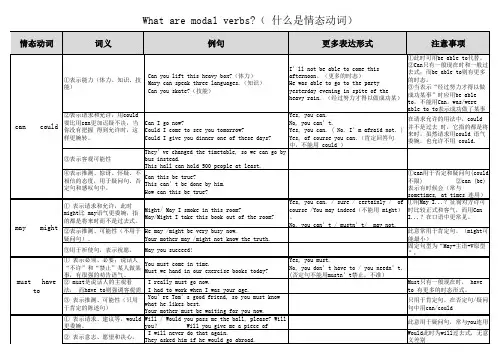
①此时可用be able to代替。 ②Can只有一般现在时和一般 I’ll not be able to come this 过去式;而be able to则有更 afternoon。(更多的时态) 多的时态。 He was able to go to the party ③当表示“经过努力才得以做 yesterday evening in spite of the heavy rain. (经过努力才得以做成功某) 成功某事”时应用be able to,不能用Can。was/were able to to表示成功做了某事 Yes, you can. 在请求允许的用法中,could No, you can’t. 并不是过去 时,它指的都是 Yes, you can. ( No, I’m afraid not. ) 将来时,虽然请求用could 语 Yes, of course you can.(肯定回答句 气委婉,也允许不用 could. 中,不能用 could )
may
might ②表示推测、可能性(不用于 He may /might be very busy now.
疑问句)。 ③用于祈使句,表示祝愿。 ① 表示必须、必要;说话人 “不许”和“禁止”某人做某 事,有很强的劝告语气。 ② must是说话人的主观看 法, 而have to则强调客观需 Your mother may /might not know the truth. May you succeed! You must come in time. Must we hand in our exercise books today?
can
②表示请求和允许,用could Can I go now? could 要比用can更加迟疑不决,当 Could I come to see you tomorrow? 你没有把握 得到允许时,这 Could I give you dinner one of these days? 样更婉转。 ③表示客观可能性 They’ve changed the timetable, so we can go by bus instead. This hall can hold 500 people at least.
情态动词简表
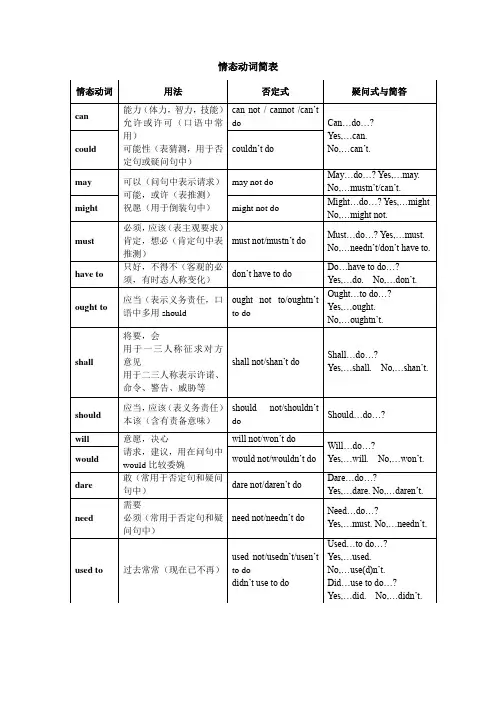
didn’t use to do
Used…to do…?
Yes,…used. No,…use(d)n’t.
Did…use to do…?
Yes,…did. No,…didn’t.
情态动词简表
情态动词
用法
否定式பைடு நூலகம்
疑问式与简答
can
能力(体力,智力,技能)
允许或许可(口语中常用)
可能性(表猜测,用于否定句或疑问句中)
can not / cannot /can’t do
Can…do…?
Yes,…can.
No,…can’t.
could
couldn’t do
may
可以(问句中表示请求)
可能,或许(表推测)
Must…do…? Yes,…must.
No,…needn’t/don’t have to.
have to
只好,不得不(客观的必须,有时态人称变化)
don’t have to do
Do…have to do…?
Yes,…do. No,…don’t.
ought to
应当(表示义务责任,口语中多用should
dare
敢(常用于否定句和疑问句中)
dare not/daren’t do
Dare…do…?
Yes,…dare. No,…daren’t.
need
需要
必须(常用于否定句和疑问句中)
need not/needn’t do
Need…do…?
Yes,…must. No,…needn’t.
used to
过去常常(现在已不再)
情态动词归纳表格
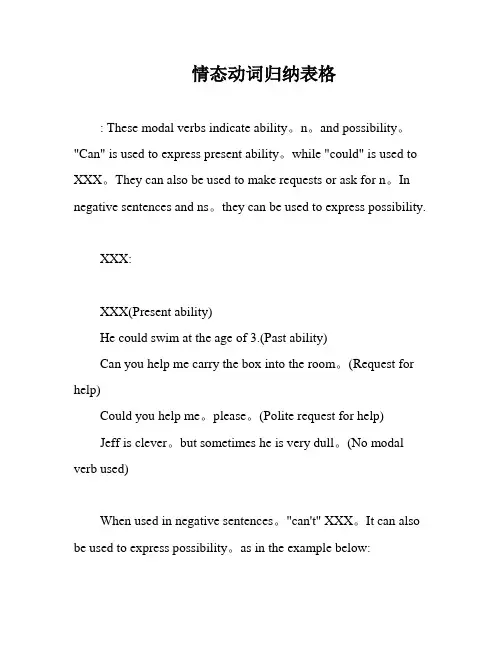
情态动词归纳表格: These modal verbs indicate ability。
n。
and possibility。
"Can" is used to express present ability。
while "could" is used to XXX。
They can also be used to make requests or ask for n。
In negative sentences and ns。
they can be used to express possibility.XXX:XXX(Present ability)He could swim at the age of 3.(Past ability)Can you help me carry the box into the room。
(Request for help)Could you help me。
please。
(Polite request for help)Jeff is clever。
but sometimes he is very dull。
(No modal verb used)When used in negative sentences。
"can't" XXX。
It can also be used to express possibility。
as in the example below:He can't be at home right now。
for I saw him go out just now。
(Impossibility)He can't be studying in the classroom。
for I saw him go tothe football field with a football。
人教版三年级下册英语情态动词汇总默写表
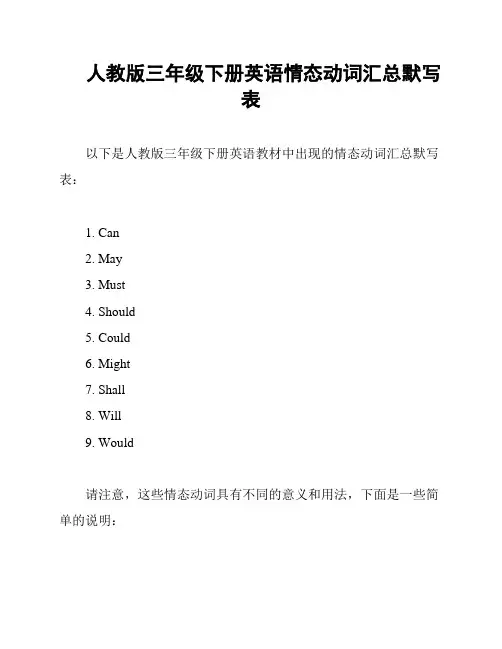
人教版三年级下册英语情态动词汇总默写
表
以下是人教版三年级下册英语教材中出现的情态动词汇总默写表:
1. Can
2. May
3. Must
4. Should
5. Could
6. Might
7. Shall
8. Will
9. Would
请注意,这些情态动词具有不同的意义和用法,下面是一些简单的说明:
1. Can:表示能力、许可或可能性,常用于请求、建议和询问中。
2. May:表示允许、请求或可能性,常用于请求、询问和表达允许。
3. Must:表示必须、推测或确定性,常用于表达义务、推测和确定性陈述。
4. Should:表示应当、建议或期望,常用于提建议、表达期望和陈述理论。
5. Could:表示能够、可能或请求,常用于请求、表达可能性和假设。
6. Might:表示可能、请求或推测,常用于表达可能性、请求和推测。
7. Shall:表示将要、应当或建议,常用于表示将来、提出建议和陈述法律义务。
8. Will:表示将要、意愿或承诺,常用于表示将来、表达意愿和做承诺。
9. Would:表示愿意、过去惯或虚拟条件,常用于表达意愿、过去惯和虚拟条件。
这些情态动词在句子中常常和其他动词搭配使用,根据具体语境产生不同的意义。
默写时可以尝试用这些情态动词造句,加深对其用法的理解和记忆。
希望以上信息对你有所帮助,祝你研究进步!。
情态动词总结表格
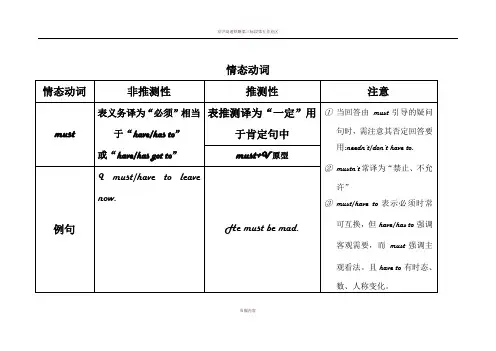
Can you speak English?
You can go now.
Can/Could I use your phone please?
He can’t be our teacher.
He has gone toBeijing.
may/might
表示请求、许可,译为“可以”相当于can
表示推测,译为“可能,也许”
Will/Would let me use your phone please?
确定性的程度
might<may<could<can<would<will<must
1在表示推测中,can’t 译为“不可能”,may not 译为“可能不”。can’t比may not语气更强。
2can表推测常用语否定和疑问句中。may常用于肯定句中。
3could、might、would等情态动词不表示过去,而表示一种委婉语气。
may/might+V原型
例句
I must/have to leave now.
He must be mad.
can/could
1表示“能够、允许”
2表示请求
can’t表推测译为“不可能”常用于否定句中。
can 表示推测时常用于否定句或疑问句中。译为“不可能;”肯定推测用must “一定”或may“也许”。
can’t+V原型
May/MightIuse your phone please?
Hemay/might telephoned last night,butI’m not sure.
will/would
表示意愿
表示请求
在表示请求时,would比will更委婉。
例句
情态动词的用法总结表格
情态动词的用法总结表格|情态动词|用法|例句||||||can|表示能力,“能,会”|I can swim 我会游泳。
|||表示许可,“可以”|You can go now 你现在可以走了。
|||表示可能性,“可能”|It can be very cold in winter 冬天可能会很冷。
||could|can 的过去式,表示过去的能力|I could ride a bike when I was five 我五岁时就能骑自行车。
|||could 可用于委婉地提出请求、建议等|Could you please help me? 您能帮我一下吗?||may|表示许可或请求许可,“可以”|May I come in? 我可以进来吗?|||表示可能性,“也许,可能”|It may rain tomorrow 明天可能下雨。
||might|may 的过去式|He said that he might come 他说他可能来。
|||用于可能性较小的推测|She might be at home 她也许在家。
||must|表示必须,强调主观上的“必须”|You must finish your homework 你必须完成作业。
|||表示肯定的推测,“一定”|He must be very tired 他一定很累了。
||have to|表示客观上的“不得不”|I have to go now 我现在得走了。
|||有人称、数和时态的变化|She has to do a lot of housework 她不得不做很多家务。
||should|表示应该,常用来提出建议|You should study hard 你应该努力学习。
|||表示推测,“应该”|They should be there by now 他们现在应该到那儿了。
||ought to|同 should ,表示应该|You ought to listen to your parents 你应该听你父母的话。
(完整版)情态动词归纳表
情态动词归纳表高考热点透视热点一:表猜测的情态动词的用法。
热点二:情态动词+have done情态动词+have done的用法有两种含义:1. 对过去情况的猜测。
由表猜测的情态动词+have done构成。
上表已经提到。
2. 表示与过去事实的主观设想。
有轻微的责备、后悔之意。
请参看下表:热点三:shall,will,must等1. Shall ①用于第一人称疑问句中表示说话人征求对方的意见或向对方请求。
例:—The room is so dirty. _______ we clean it?—Of course. ( 03 上海春招)A. WillB. ShallC. WouldD. Do②用于第二人称陈述句表示说话人或他人的意图、命令、允诺、警告、命令等。
例:“The interest _______ be divided into five parts, according to the agreement made by both sides,” declared the judge. (04 重庆,24)A. mayB. shouldC. mustD. shall2. Will ①表示意愿或意志。
例:I __________ argue with you.②当主语是物时,则表示“不起作用”。
例:The drawer _________ shut.3. Must 表“必须、一定要”。
例:— Who is the girl standing over there?— Well, if you _______ know, her name is Mabel. (02,天津)A. mayB. canC. mustD. shall。
情态动词助记表
情态动词常见情态动词有:can , could , may , might , must , have to , will , would , shall , should , ought to , need , dare used to , be able to , had to , would rather.一、助记忆表情态V词义&用法注意事项特殊用法can could 1.表具备某种能力Can表现在能力;Could表示过去能力.可用be able to代替;was/were able to to表示成功做了某事(1)表惊异、怀疑、不相信、不耐烦等。
(此意常用于否定句、疑问句或惊叹句语气)Can/Could this be true?(2)can not…too\enough表示"无论怎样``````也不过分","越``````越好":Y ou can't be too careful.2.表请求和允许①请求用could 语气委婉②允许不用could.3.表“可能性”①can用于否定和疑问句(could不限)②can (be)表示有时候会(常与sometimes, at times 连用)may might 1.表请求和允许①请求用might语气更委婉。
②允许时用may,表示“可以”(表示允许时不用might)。
(1)may/might well+V原形:表"完全可能,,很可能"= be very likely to:He maywell be proud for his son.(2)may/might as well+V原形:"最好,满可以,倒不如"Y ou may as well stay here over night.2.表可能性“也许”此意常用于肯定句。
(might可能最小)3表祝愿固定句型为“May+主语+V原型”:May you succeed!must 1.表“必须”①must多表主观、现在/将来义务;have to多表客观、过去义务②mustn't表"禁止";否定用needn't /don't have to (1)表示必然结果:All men must die.人固有一死。
情态动词归纳表格
1. can/could 能力He can sing songs in French.He could swim at the age of 3.表示请求Can you help me carry the box into the room?Could you help me, please?可能性,表示有时会针对不同时间表示推测(只能用于否定句和问句) Jeff is clever, but sometimes he is very dull.can’t doHe can’t be at home right now, for I saw him go out just now.can’t be doingHe can’t be studying in the classroom, for I saw him g o to the football field with a football.can’t have doneHe can’t have finished homework so soon, for he didn ’t come to school yesterday.Where can I have put my keys?2. may/might 允许表示祝愿针对不同时间表示推测(只能用于否定句和问句) May I smoke here?May you a happy life!may doHe may come, but he is not sure. may be doingJim may be reading in the library. may have doneHe may have left the bag in the library.3. must 肯定形式表示必须,应该;否定形式表示绝对禁止,语气强烈回答 must/need 的一般疑问句时,肯定回答用 must; 否定回答用needn’t/don’t have to针对不同时间表示推测(只能用于肯定句) You must have a passport if you want to go abroad. You mustn’t take photos here!Must I come back home early? Yes, you must. Need I come back late? No, you needn’t/don’t have to.must doTom must study hard, for he always gets the first place every time.must be doingIt’s so noisy upstairs. They must be quarreling again. must have doneIt must have been around 9:00, because it was totally dark.4. shall 一三人称的问句表示请求Shall he wait here?What shall we do next?二三人称的陈述句表示允诺,警告,命令,威胁…You shall get an answer tomorrow.5. should 劝告,建议根据客观事实作出的的判断,可能性较大You should see your parents regularly. It’s 7:20. He should come.why/how+should 表示说话人对Why should you be so late today?某事不能理解,感到意外,译为“竟会”6. will7. would8. need/dare半情态动词9. ought to10. have to 表示意愿表示请求习惯性动作,指现在表示意愿表示请求习惯性动作,指过去作情态动词时常用于否定和问句中;作实意动词时常用于肯定句need doing 是主动表示被动=needto be done应该否定形式:oughtn’t/ought not to不得不Tom is ill at home. I will see after school.Will you please open the door for me?Accident will happen.He said he would give me a gift.Would you please clean up the messy room?We would sit around grandpa, listening to his story.Need I tell him all? You needn’t tell us.He dares to answer questions loudly in front of us.The machine needs repairing. = The machine needsto be repaired.You ought to make an apology to him.He oughtn’t attend the meeting.I can’t see things clearly, I have to wear glasses.情态动词+have done1. must have 对过去的肯定推测(只能用于肯 She must have earned much money, for he bought andone 定句)译为“过去肯定…” expensive car last week.2. cannot have 对过去的否定推测(只能用于否He can’t have gone far, for his coat is still here.done 定句)译为“过去肯定没有…”can have done3. may/mightnot havedone4. should/oughtto have done 5. should not/ought not tohave done 6. could havedone7.couldn’thave done 8. needn’t havedone 还可用于问句表示对过去的推测表示对已经发生的事进行推测,可能性不大过去该做而没有做做了不该做的事(过去)过去本来可以做某事,但没有做过去不能做而做了的事过去不必做的事却做了Where can he have put the bag?I can’t find purse anywhere. You may have dropped itwhen you were shopping in the market.You should have come to school if you were reallyserious about your study.We oughtn’t to have given him so much money.He could have visited the Great Wall but it suddenlybegan to rain yesterday.He couldn’t have known the decision, but someonetold him.You needn’t have finished the homework because youwere ill.。
- 1、下载文档前请自行甄别文档内容的完整性,平台不提供额外的编辑、内容补充、找答案等附加服务。
- 2、"仅部分预览"的文档,不可在线预览部分如存在完整性等问题,可反馈申请退款(可完整预览的文档不适用该条件!)。
- 3、如文档侵犯您的权益,请联系客服反馈,我们会尽快为您处理(人工客服工作时间:9:00-18:30)。
You should have come to school if you were really serious about your study.
5.should not /ought not to have done
做了不该做的事(过去)
We oughtn’t to have given him so much money.
You mustn’t take photos here!
回ห้องสมุดไป่ตู้must/need的一般疑问句时,肯定回答用must;否定回答用needn’t/don’t have to
Must I come back home early? Yes, you must.
Need I come back late? No, you needn’t/don’t have to.
Where can I have put my keys?
2.may/might
允许
May I smoke here?
表示祝愿
May you a happy life!
针对不同时间表示推测(只能用于否定句和问句)
may do
He may come, but he is not sure.
may be doing
7.would
表示意愿
He said he would give me a gift.
表示请求
Would you please clean up the messy room?
习惯性动作,指过去
We would sit around grandpa, listening to his story.
8.need/dare半情态动词
Why should you be so late today?
6.will
表示意愿
Tom is ill at home. I will see after school.
表示请求
Will you please open the door for me?
习惯性动作, 指现在
Accident will happen.
The machine needs repairing. = The machine needs to be repaired.
9.ought to
应该
否定形式:oughtn’t/ought not to
You ought to make an apology to him.
He oughtn’t attend the meeting.
3.may/mightnothave done
表示对已经发生的事进行推测,可能性不大
I can’t find purse anywhere. You may have dropped it when you were shopping in the market.
4.should/ought to have done
针对不同时间表示推测(只能用于肯定句)
must do
Tom must study hard, for he always gets the first placeeverytime.
must be doing
It’s so noisy upstairs. They must be quarreling again.
must have done
It must have been around 9:00, becauseit wastotally dark.
4.shall
一三人称的问句表示请求
Shall he wait here?
What shall we do next?
二三人称的陈述句表示允诺,警告,命令,威胁…
Jeff is clever, but sometimes he is very dull.
针对不同时间表示推测(只能用于否定句和问句)
can’t do
He can’t be at home right now, for I saw him go out just now.
can’t be doing
He can’t be studying in the classroom, for I saw him go to the football field with a football.
can’t have done
He can’t have finished homework so soon, for he didn’t come to school yesterday.
6.could have done
过去本来可以做某事,但没有做
He could have visited the Great Wall but it suddenly began to rain yesterday.
7.couldn’thave done
过去不能做而做了的事
He couldn’t have known the decision, but someone told him.
Jim may be reading in the library.
may have done
He may have left the bag in the library.
3.must
肯定形式表示必须,应该;否定形式表示绝对禁止,语气强烈
You must have a passport if you want to go abroad.
8.needn’t have done
过去不必做的事却做了
You needn’t have finished the homework because you were ill.
1.can/could
能力
He can sing songs in French.
He could swim at the age of 3.
表示请求
Can you help me carry the box into the room?
Could you help me, please?
可能性, 表示有时会
2.cannot have done
对过去的否定推测(只能用于否定句)译为“过去肯定没有…”
Hecan’t have gone far, for his coat is still here.
can have done
还可用于问句表示对过去的推测
Where can he have put the bag?
作情态动词时常用于否定和问句中;作实意动词时常用于肯定句
Need I tell him all? You needn’t tell us.
He dares to answer questions loudly in front of us.
need doing是主动表示被动=need to be done
You shall get an answer tomorrow.
5.should
劝告,建议
You should see your parents regularly.
根据客观事实作出的的判断,可能性较大
It’s 7:20. He should come.
why/how+should 表示说话人对某事不能理解,感到意外,译为“竟会”
10.have to
不得不
I can’t see things clearly, I have to wear glasses.
情态动词+have done
1.must have done
对过去的肯定推测(只能用于肯定句)译为“过去肯定…”
She must have earned much money, for he bought an expensive car last week.
